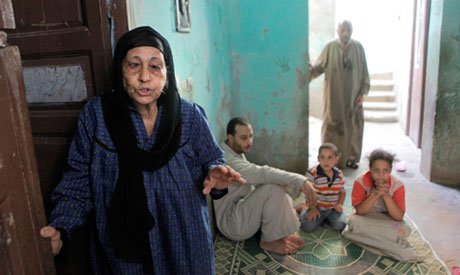
Egyptian President Mohamed Morsi has ordered authorities to punish the culprits of recent sectarian clashes in the town of Dahshur, Giza "to the full extent of the law," Morsi spokesman Yasser Ali said Thursday.
Last week, a personal quarrel between a Muslim and a Coptic-Christian in the town quickly escalated, drawing in residents from both communities. Clashes ensued, eventually leaving one Muslim resident dead and several injured.
The incident prompted hundreds of Christians to stage a demonstration in front of Egypt’s Presidential Palace, located in Cairo's Heliopolis district, on Thursday.
The Maspero Youth Union, a revolutionary group that defends Coptic rights, released a statement following the Dahshur clashes in which it said that 120 Coptic families had since been expelled from the area.
"President Morsi closely monitored the Dahshur incident yesterday and today," Ali said in a Thursday statement. "His Excellency has ordered the relevant authorities to strictly implement the law and not allow anyone to violate it."
"He stressed that warm relations between Egyptian citizens, Muslims and Christians, should remain intact," the presidential spokesman added. "He also underscored that he would never allow anyone to attack public or private property or terrorise any Egyptian citizen."
Clashes reignited early Wednesday when one Muslim Dahshur resident, Moaz Mohamed, died of injuries sustained during the earlier melee. Several homes belonging to Christian residents of the town, in addition to two local Coptic-owned businesses, were torched by residents angered by Mohamed's death.
Security forces intervened when Muslim and Christian residents began shooting at one another and hurling Molotov cocktails and stones, leaving nine people injured.
The Coptic Orthodox Patriarchate in Abbasiya, Cairo, has since called on authorities to deal firmly with the issue, saying this was the only way to stop the ongoing "wave of violence against Egypt's Copts."
"We saw that the authorities were not dealing with the situation with the firmness required for such cases," the Patriarchate declared in a Thursday statement.
"The authorities must quickly bring the perpetrators to justice and allow the Copts to return to their homes," the Patriarchate added. "The authorities should also financially compensate all those who were harmed in the incident."
On Thursday, the Shura Council – the upper, consultative house of Egypt's parliament – set up an eight-member committee tasked with reconciling Dahshur's Muslim and Christian communities in a bid to pre-empt further violence.
"This isn't a fact-finding committee, it's a reconciliation committee," Shura Council head Ahmed Fahmi was quoted as saying by Al-Ahram’s Arabic-language news website. "Our aim is to achieve reconciliation between the two sides rather than determining who the culprits were."
Best known for its ancient pyramids, Dahshur, a religiously mixed town, is located in Giza, roughly 40 kilometres south of Cairo. It contains Egypt's famous Bent Pyramid and Red Pyramid, both of which were built during the reign of Pharaoh Sneferu.
The last major sectarian clashes that erupted in Egypt took place in May 2011.
At least twelve people were killed and 186 injured in Imbaba, Giza, in fights between Muslims and Copts due to a controversy over allegations made by some salafists a Christian woman had been abducted by the Coptic Church and held against her will after she reportedly converted to Islam. Those reports were refuted by the woman later.
Forced migration of Copts has also been reported in the past, following sectarian clashes over the past two years. The most recent example of the forced migration of Copts was reported to have taken place in January of this year in the town of Ameriya in Alexandria.
